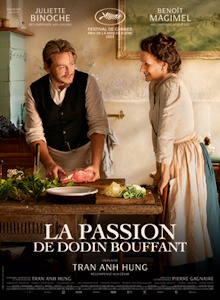We watched Vietnamese director Trần Anh Hùng’s debut film some time ago and nothing since because they didn’t seem notable enough. Now here he is with an outstanding film that all the more surprising because of how French it is. This is nothing less than a pure love letter to classical French cuisine that is simply overflowing with passion for food. The term food porn is now part of vernacular but this film takes it to a new extreme and even weaves food deeply into the relationship between the two main characters. I’m not a foodie so I’m left bemused by its audacity but I have to admire the director’s total commitment and the excellence of the execution.
In late 19th-century France, Eugénie is a cook who has worked for decades for Dodin, a gourmet chef who has been hailed as the Napoleon of cuisine. They live in Dodin’s estate in the countryside and though they are unmarried and maintain separate bedrooms, are lovers. Over the years, Dodin has asked her to marry him many times but she has always refused. One day, the niece of their live-in maid Violette is visiting. The young girl, named Pauline, turns out to have a talent at identifying ingredients. On the same day, Dodin hosts a meal for his close friends who are all gourmands who enjoy fine food. After the meal, a messenger arrives with an invitation from the Prince of Eurasia for Dodin to dine with the prince. He accepts on condition that his friends join him. Eugénie and Dodin decide to take in Pauline and train her as a chef. The dinner with the prince proves to be a disappointment as it is merely a deluge of food with no thought towards quality or balance. Afterwards, Eugénie finally accepts Dodin’s proposal when he cooks a personal meal for her. At the same time however, she has been experiencing fainting spells but keeps dismissing them as not being serious.
We’ve all seen cooking shows that focus on every step of the preparation of elaborate dishes with close-in shots. This film takes things one step further as it is set in the 19th-century and so places the cooking closer to the context in which the particular recipes were originally invented. It’s one thing to watch dishes like the veal with braised lettuce and the Baked Alaska dessert being prepared in a modern kitchen. It’s another to watch the entire process beginning with the water being drawn from a well in a world with no electricity. Most of all however, it also shows Dodin and his friends consuming the food with gusto and washing it down with wine. They tell each other stories about the origins of different recipes, about particular ingredients and wines and visibly enjoy each other’s company. In this way, the audience vicariously experiences their pleasure through the magic of cinema and the excellence of the photography. To my mind, this is surely the ultimate depiction of the bon vivant lifestyle put on film.
The food takes center stage so much so that at times it feels like there is no plot. But there is a story in here about the relationship between Dodin and Eugénie. It’s a sweet, heartwarming tale about romance in the autumn of both their lives as Dodin puts in. Yet even here Trần returns to the theme at large. Despite the decades they’ve spent together and the nights Eugénie has spent in Dodin’s bed, it is still their joint love of food that binds them together. I think it’s a little risible that food should rank above all else but the commitment is impressive. I liked how it treats the issue of Pauline’s apprenticeship as well. No matter her talent, Dodin insists that no one can become a fully qualified cook before the age of 40. Both him and Eugénie look forward to Pauline creating wonderful new dishes of her own one day but that is something for the future. Plus of course, in true bon vivant fashion, the film asserts boldly that the joy of eating and tasting good food is enough to rouse one from the deepest throes of grief.
The production quality is sky high, capturing the texture of the foods, the sizzling of the cooking process, the deft movement of hands as they work the ingredients. One can almost imagine the smell of it in the air in that 19th-century kitchen. Accompanied by anecdotes of famous chefs and their most famous creations, as well as observations of how scientific progress brings with it the potential to create new, heretofore unimagined dishes, this is a showcase of classical French cuisine like no other.
